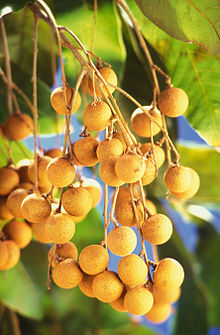Longan
| Longan | |
|---|---|

| |
| Longan fruit | |
| Scientific classification | |
| Kingdom: | |
| (unranked): | |
| (unranked): | |
| (unranked): | |
| Order: | |
| Family: | |
| Genus: | |
| Species: | D. longan
|
| Binomial name | |
| Dimocarpus longan | |
| Synonyms | |
|
Euphoria longan Steud.
| |
The longan (simplified Chinese: 龙眼; traditional Chinese: 龍眼; pinyin: lóngyǎn, literally "dragon eye") is a tropical tree native to southern China. It is also found in Southeast Asia.
Description
The tree can grow up to 67 metres in height, and the plant is very sensitive to frost. Longan trees require sandy soil and temperatures that do not typically go below 4.5 degrees Celsius (40 degrees Fahrenheit). Longans and lychees bear fruit at around the same time of the year.
The longan ("dragon eyes") is so named because its fruit, when it is shelled, resembles an eyeball (the black seed shows through the translucent flesh like a pupil/iris). The seed is small, round and hard, and of an enamel-like, lacquered black. The fully ripened, freshly harvested shell is bark-like, thin, and firm, making the fruit easy to shell by squeezing the fruit out as if one is "cracking" a sunflower seed. When the shell has more moisture content and is more tender (due to either premature harvest, variety, weather conditions, or transport/storage conditions), the fruit becomes less convenient to shell.
Culinary uses

The fruit is edible, extremely sweet, juicy and succulent in superior agricultural varieties, and apart from ingested fresh, is also often used in East Asian soups, snacks, desserts, and sweet-and-sour foods, either fresh or dried, sometimes canned with syrup in supermarkets.
Dried longan, called guìyuán (桂圆) in Chinese, are often used in Chinese cuisine and Chinese sweet dessert soups. In Chinese food therapy and herbal medicine, it is believed to have an effect on relaxation. In contrast with the fresh fruit, which is juicy and white, the flesh of dried longans is dark brown to almost black. In Chinese medicine the longan, much like the lychee, is thought to give internal "heat" (上火).
See also
References
External links
- Fruits of Warm Climates: Longan
- Dimocarpus longan (Sapindaceae)
- Longan Production in Asia from the Food and Agriculture Organization of the United Nations

